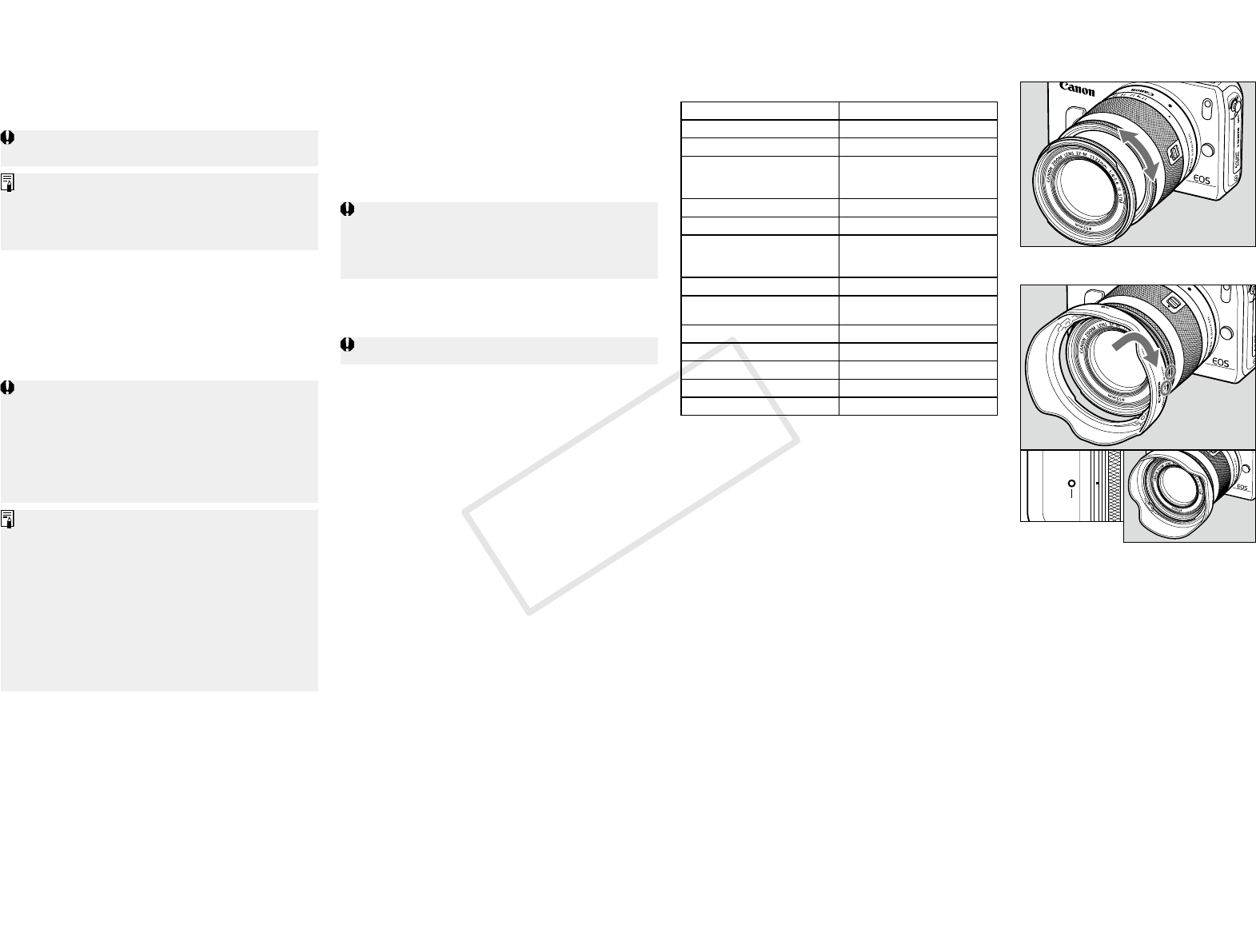
❺
❻
4. Manual Focus
When the camera’s focus mode is set to [MF], focus manually
by turning the focusing ring. (fig.❺)
Quickly rotating the focusing ring may result in delayed
focus.
•
Focus mode is set using the camera. Please refer to the
camera’s instructions.
•
After autofocusing in [AF+MF] mode, focus manually
by pressing the shutter button halfway and turning the
focusing ring (full-time manual focusing).
5. Image Stabilizer
This lens is equipped with an Image Stabilizer. This function
corrects camera shake, allowing users to capture sharp
images. Also, the Image Stabilizer automatically provides
optimal image stabilization depending on shooting conditions
(such as shooting still subjects and following shots). Please set
the Image Stabilizer ON or OFF using the camera settings. See
your camera’s instructions for details.
•
The Image Stabilizer cannot compensate for a blurred
shot caused by a subject that moved.
•
The Image Stabilizer may not be fully effective if
you shoot from a violently shaking vehicle or other
transportation.
•
The Image Stabilizer consumes more power than normal
shooting, so fewer shots can be taken if you use the
function.
•
When shooting a still subject, it compensates for camera
shake in all directions.
•
It compensates for vertical camera shake during following
shots in a horizontal direction, and compensates for
horizontal camera shake during following shots in a
vertical direction.
•
When you use a tripod, the Image Stabilizer should be
turned off to save battery power.
•
Even with a monopod, the Image Stabilizer will be as
effective as during hand-held shooting.
However, depending on the shooting environment, the
Image Stabilizer effect may be less effective.
■ Dynamic IS Function (Movie shooting only)
The EF-M11-22mm f/4-5.6 IS STM is equipped with dynamic
IS, effective when shooting while walking since it expands the
IS range.
•
Achieves effective IS at the wide end.
•
Automatically activates when the camera is set to Movie
Shooting.
6. Hood (sold separately)
The EW-60E hood cuts out unwanted light and protects the
front of the lens from rain, snow, and dust.
To attach the hood, align the hood’s attachment position mark
with the red dot on the front of the lens, then turn the hood as
shown by the arrow until the lens’ red dot is aligned with the
hood’s stop position mark. (fig.❻)
The hood can be reverse-mounted on the lens for storage.
•
If the hood is not attached properly, vignetting (darkening
of the perimeter of the picture) may occur.
•
When attaching or detaching the hood, grasp the base of
the hood to turn it. To prevent deformation, do not grasp
the rim of the hood to turn it.
7. Filters (sold separately)
You can attach filters to the filter mounting thread on the front
of the lens.
Only one filter may be attached.
0613Ni © CANON INC. 2013 ENG-2
Specifications
Focal Length/Aperture 11-22mm f/4-5.6
Lens Construction 9 groups, 12 elements
Minimum Aperture f/22-32
Angle of View
Diagonal: 102°10'-63°30'
Vertical: 68°55'-37°50'
Horizontal: 91°50'-54°30'
Min. Focusing Distance 0.15 m/0.49 ft.
Max. Magnification 0.3x (at 22 mm)
Field of View
Approx. 103x155-50x74 mm/
4.06x6.10-1.97x2.91 inch
(at 0.15 m/0.49 ft.)
Filter Diameter 55 mm
Max. Diameter and Length
(When the lens is retracted)
60.9x58.2 mm/2.40x2.30 inch
Weight Approx. 220 g/7.8 oz
Hood EW-60E (Sold Separately)
Lens Cap E-55
Dust Cap Lens Dust Cap EB
Case LP814 (Sold Separately)
•
Equivalent to 18-35 mm in the 35mm film format.
•
The lens length is measured from the mount surface to the
front end of the lens. Add 20.2 mm when including the lens
cap and dust cap.
•
The size and weight listed are for the lens only, except as
indicated.
•
Extenders cannot be used with this lens.
•
Aperture settings are specified on the camera. The camera
automatically compensates for variations in the aperture
setting when the camera is zoomed in or out.
•
All data listed is measured according to Canon standards.
•
Product specifications and appearance are subject to change
without notice.
C OPY




